 |
 |
 |
 |
| |
||||
Healthy HazardCBS 2 News Special Assignment 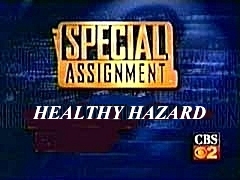 Domestic flights are not only smoke-free, some are now peanut-free. Domestic flights are not only smoke-free, some are now peanut-free. Schools are removing peanuts and peanut butter from the lunch menu and many restaurants are warning diners about dishes that contain peanuts. Why the sudden campaign against one of America's most beloved staples? CBS 2 News' Lonni Leavitt shells out the story in tonight's Special Assignment Special Assignment: Healthy Hazard aired Monday, October 19, 1998 at 11 p.m. "I looked back at Juliet and her eyes had all swollen up with these fluid-filled blisters, and she had these really red hives around her mouth, and then her eyes rolled back in her head," Larsen told CBS 2 New's Lonni Leavitt. Juliet had suffered a severe allergic reaction after taking a single bite of a peanut butter sandwich. "The nurse told me, 'We didn't want to say anything but quite frankly for the first several hours we did not think your child was going to survive this,'" said Larsen. Because so many people are unaware of the danger, Larsen told Leavitt she's always on alert and on the defensive. Put yourself in Larsen's shoes. When she's in her own home she can keep the peanut products and protect her daughter, but the minute Juliet steps outside to a grocery store, to school, to a friend's house or even a restaurant, that's when it starts to get tricky, said Leavitt.
"In fact, most of the severe allergy reactions to peanuts happen outside the home from accidental ingestion," Dr. Michael Kaplan, an allergist at Kaiser-Permanente Medical Center, told Leavitt. "Of all the food allergies, peanuts and shell fish are more likely to cause more serious, life-threatening reactions." The close quarters on airplanes pose another risk. "That's one of the reasons the peanut-free zone was created because the dust from opening bags of peanuts would spread in the airplane," Kaplan said. Larsen is also always prepared with injectable adrenalin. Larsen hopes her little girl will never need the injection so she's asking for your understanding. "I say perhaps you don't understand that this food can kill my child, and my child has more of a right to life than a peanut butter sandwich," said Larsen. More information:
|
||||||||||

|
||||||||||
|
Retire Rich
 |

 |
||
|
12 p.m.
Woman 2 Woman One of the stars from "Judging Amy" 5 p.m. 6 p.m. 11 p.m.
|
||
 |
||
|
4-5 p.m.
Judge Judy Ruler Of The Free World! 8:00 p.m. 8:30 p.m.
9:00 p.m.
|
||
| |
||
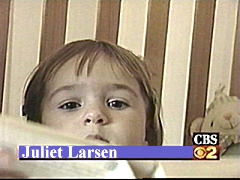 Louise Larsen has no trouble recalling how peanuts nearly killed her 1-year-old daughter Juliet.
Louise Larsen has no trouble recalling how peanuts nearly killed her 1-year-old daughter Juliet. 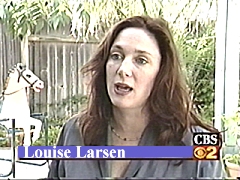 "It's unbelievable how many people hand children candy or cookies," Larsen said. "I'm constantly having to be the heavy and say, 'Oh, thank you so much but my child has a fatal peanut allergy.' And I would say 50 percent of the time that's met with extreme skepticism, if not ... hostility."
"It's unbelievable how many people hand children candy or cookies," Larsen said. "I'm constantly having to be the heavy and say, 'Oh, thank you so much but my child has a fatal peanut allergy.' And I would say 50 percent of the time that's met with extreme skepticism, if not ... hostility." 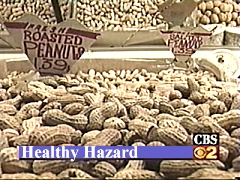 The allergen in peanuts is a protein that can trigger anaphylactic shock and it can happen even if peanuts aren't in a dish's recipe, said Leavitt. There can still be a hidden danger from cross-contamination if peanuts were cooked in oil or saut�ed in a pan that was used to prepare a peanut-free dish. Many restaurants also use peanut butter to thicken sauces.
The allergen in peanuts is a protein that can trigger anaphylactic shock and it can happen even if peanuts aren't in a dish's recipe, said Leavitt. There can still be a hidden danger from cross-contamination if peanuts were cooked in oil or saut�ed in a pan that was used to prepare a peanut-free dish. Many restaurants also use peanut butter to thicken sauces. 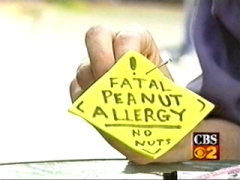 Larsen says there's still no guarantee that Juliet will be able to avoid peanuts. So, in addition to her daughter's mecial bracelet, Larsen made a yellow pin Juliet wears on her chest to alert others of of her fatal allergy to peanuts.
Larsen says there's still no guarantee that Juliet will be able to avoid peanuts. So, in addition to her daughter's mecial bracelet, Larsen made a yellow pin Juliet wears on her chest to alert others of of her fatal allergy to peanuts. 

